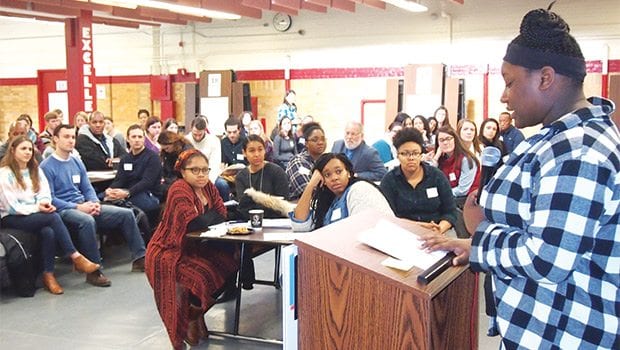New Hub group organizes parents, teachers, students for education agenda
Newly-formed Boston Education Action Network is affiliated with Teach for America political action arm, taps alumni network

Saturday morning, more than a hundred parents, teachers and students gathered in the cafeteria of TechBoston Academy’s Dorchester building to hash out ideas for education reform in Boston.
Speaking before the gathering, TechBoston Academy math teacher Alia Verner seemed to echo the sentiments of many participants as she described why she felt called to action on a wintery Saturday morning.
On the web
Leadership for Educational Equity: https://educationalequity.org/
For financial information, go to Guidestar’s profile at: https://www.guidestar.org/profile/27-1863010
“Everyone here believes that all students deserve access to a high-quality education,” she said. “I’m worried for my students because they are participating in an education system that is inequitable and unjust.”
At different corners of the cafeteria, Varner and other participants broke into groups to discuss the 20 issue areas organizers with the new group, the Boston Education Action Network (BEAN), identified from their conversations with parents and educators in more than 20 house meetings and one-on-one conversations in which they engaged over recent months.
In the TechBoston auditorium, the groups identified and voted on the top three issue areas worth pursuing, choosing school discipline and social emotional learning, recruiting and retaining teachers of color and culturally-relevant curricula, and school enrollment policies and affordable housing.
BEAN is a new player in Boston’s education activism scene, emerging in the wake of battle over Question 2. That was the most costly ballot question in the state, wherein charter school expansion proponents and opponents waged a $30 million advertising and ground game war. While the question of charter school expansion did not come up in the meeting, the aftermath of the bitter battle flared when one parent activist, Chris Hoeh, asked BEAN organizers about the source of their funding.
The organizers did not answer Hoeh’s question publicly, instead inviting him to a separate room for a conversation. The group’s parent organization, Leadership for Educational Equity (LEE) — a 501(c)(4) political action arm of Teach for America — has drawn some scrutiny from education activists. LEE’s board includes education privatization advocates Emma Bloomberg and Steuart Walton. Bloomberg’s father, the former New York Mayor Michael Bloomberg, donated $240,000 in support of Question 2. Walton’s parents donated $1.8 million.
Alumni network
LEE was founded in 2007 to draw on the network of 28,000 Teach for America alumni to promote an educational agenda. Its 501(c)(4) status as a social welfare nonprofit allows it more leeway than other categories of nonprofits to lobby legislators and create issue ads. Although LEE purports to espouse no particular political agenda, the organization does conduct fellowships for its members with elected officials and has toolkits on organizing, electoral work and advocacy on its password-protected members-only website, according to a 2012 report by journalist James Ceronsky in the American Prospect.
While most Teach for America alumni serve no more than two years as teachers, many have gone on to push for education reforms from their positions in elected office on school boards and in state legislatures or their work in school departments, including BPS.
LEE employees at the Saturday meeting stressed that BEAN is an independent organization that is not tied to the national organization’s agenda. Although the group was organizing in the fall as the battle over Question 2 was raging, BEAN did not take a position.
“The charter school issues didn’t come up,” said Peter Newman, a regional director for LEE who works in Boston, Hartford and New York.
BEAN’s organizing model seems to draw heavily from the Saul Alinsky’s Industrial Areas Foundation playbook, with house meetings and person-to-person discussions leading to a collective decision-making process on key issues on which members agree to work.
Process oriented
Cheri Andes, who previously worked with the Greater Boston Interfaith Organization — a local IAF affiliate — and now is consulting with LEE, said the organization is not focused on any particular agenda for Boston.
“The process is what’s important,” she said. “That’s why we’ve put so much emphasis on house meetings.”
The TechBoston meeting included several Educational LEE staff members, including vice presidents Jamaal Nelson and Brianna Twofoot. Also in attendance were veterans of the Yes on 2 effort, including Great Schools Mass Coalition Director Shane Dunn and former Families for Excellent Schools organizer Keri Rodriguez. Members of the Boston Education Justice Alliance, an organization that opposed Question 2, also were in attendance.
Members of BEJA who attended the meeting expressed cautious optimism about the BEAN agenda items.
“To the extent that BEAN is willing to openly talk about the need for new and alternative sources of funding in order to implement Social Emotional Learning and disrupt zero-tolerance discipline, we will work with them,” BEJA members wrote in a statement emailed to reporters following the meeting. “To the extent that BEAN is willing to openly talk about the need to curb and reduce the use of high-stakes standardized testing a strategy for diversifying our curriculums and attracting and retaining teachers of color who can teach those curriculums, we will work with them.”
BEJA members said they would also oppose open enrollment — a scheme that combines the application process for public and charter schools, citing what they said are the charters’ disparities in services for English language learners and students with special needs.






